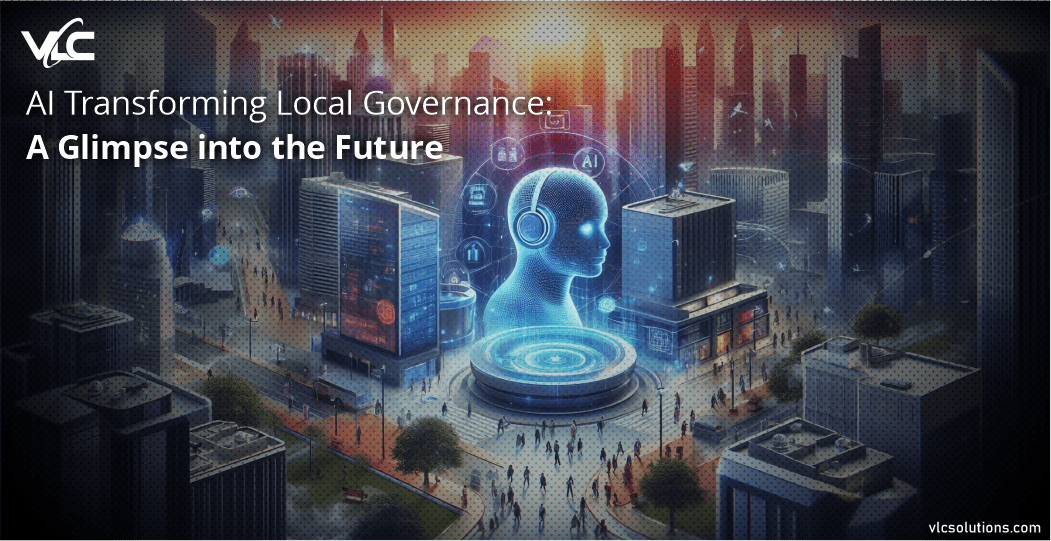AI Transforming Local Governance: A Glimpse into the Future
Around the world, artificial intelligence (AI) is changing industries and societal roles, and local government is no different. As technology advances, AI can completely transform local government, improving transparency, efficiency, and citizen engagement. This blog examines these changes and provides an outlook on the exciting future of AI in local governance systems.
The Role of AI in Local Governance
A lot of services that have an immediate influence on individuals’ daily lives are under the purview of local governments. The scope is broad, ranging from public safety and waste management to transportation and healthcare. Due to AI’s capacity to foresee outcomes, automate processes, and analyze large databases, these services could be substantially enhanced.
Enhancing Public Safety
Predictive analytics powered by AI has the potential to improve public safety. AI systems can better allocate resources for law enforcement by identifying patterns and predicting potential crime hotspots by studying previous crime data. Furthermore, AI-powered surveillance systems are able to identify anomalous activity instantly, offering a proactive method of preventing crimes.
Optimizing Traffic Management
In cities, traffic congestion is a prevalent problem. By evaluating real-time data from multiple sources, including GPS devices and traffic cameras, AI can optimize traffic flow. To ease congestion and boost overall transportation effectiveness, AI algorithms can change the timing of traffic signals, redirect cars, and even anticipate future traffic trends.
Improving Waste Management
Maintaining the environment and public health requires effective waste management. AI is capable of automating sorting procedures in recycling plants, predicting waste generation patterns, and optimizing waste pickup routes. Better services for citizens, lower environmental impact, and financial savings are all possible outcomes of these upgrades.
Streamlining Administrative Processes
Local government offices often deal with extensive paperwork and administrative tasks. Automation driven by AI can expedite these procedures, saving time and effort on things like managing public records, processing permits, and document verification. This not only improves efficiency but also frees up staff to focus on more complex issues.
Enhancing Citizen Engagement
AI has the potential to significantly increase citizen delight and participation. Virtual assistants and chatbots can offer 24×7 assistance, responding to frequently asked questions and assisting residents with a variety of tasks. Additionally, AI can analyze citizen feedback from social media and other platforms, helping local governments identify areas of improvement and respond to community needs more effectively.
The Future of AI in Local Governance
As AI technology continues to advance, its impact on local governance will only grow. Here are a few exciting prospects for the future:
Smart Cities
The idea of “smart cities” centers on using technology to enhance urban living. AI will be vital in this change, making cities more sustainable, efficient, and responsive. There are numerous possibilities, ranging from sophisticated public transit systems to smart grids that optimize energy consumption.
Predictive Policy Making
AI can revolutionize policy-making by providing data-driven insights and predictions. By analyzing trends and patterns, AI can help local governments anticipate future challenges and opportunities, allowing them to craft proactive policies that address the needs of their communities more effectively.
Personalized Public Services
Just as AI has enabled personalized experiences in the private sector, it can do the same for public services. Local governments can improve the general quality of life by customizing services to each resident’s specific requirements through the use of data from multiple sources.
Enhanced Disaster Management
AI can greatly improve disaster preparedness and response. Predictive analytics can forecast natural disasters and their potential impacts, allowing local governments to implement preventive measures and allocate resources more efficiently. During a disaster, AI can assist in real-time decision-making and coordination, ensuring a more effective response.
Data-Driven Community Planning
AI is capable of analyzing enormous volumes of data to help with community development and planning. Local governments may create sustainable and prosperous communities by making well-informed decisions regarding infrastructure, zoning, and resource allocation based on their understanding of population trends, economic patterns, and environmental considerations.
Challenges and Considerations
While the benefits of AI in local governance are substantial, there are also challenges and considerations to address:
Data Privacy and Security
The implementation of AI requires access to huge data volumes, increasing considerations about privacy and security. Local governments must establish robust data protection measures to safeguard citizen information and maintain public trust.
Bias and Fairness
AI systems can inadvertently perpetuate biases present in the data they are trained on. Guaranteeing fairness and equity in AI applications is critical, requiring continuous monitoring and adjustment to prevent discriminatory outcomes.
Cost and Resource Allocation
Integrating AI into local governance can be costly, requiring investment in technology, infrastructure, and training. Budgetary restrictions must be carefully considered, and local governments should give top priority to projects that will have the best and most positive impact on their communities.
Public Acceptance
The success of AI initiatives depends on public acceptance and trust. Local governments must engage with residents, transparently communicate the benefits and limitations of AI, and address any concerns to foster a positive perception of AI-driven governance.
Embracing AI’s Role in Local Governance Future
With so many advantages that can improve public satisfaction, efficiency, and transparency, AI is set to revolutionize local governance. In order to address the changing requirements of their communities, local governments will need to use AI technology as we move forward.
Are you prepared to explore how AI can transform the operations of your local government? Learn more about integrating AI into governance by collaborating with VLC Solutions. Our professionals are committed to helping you leverage AI to build communities that are more intelligent, receptive, and prepared for the future. Visit our website to start along this path to a future that will be truly impactful.
